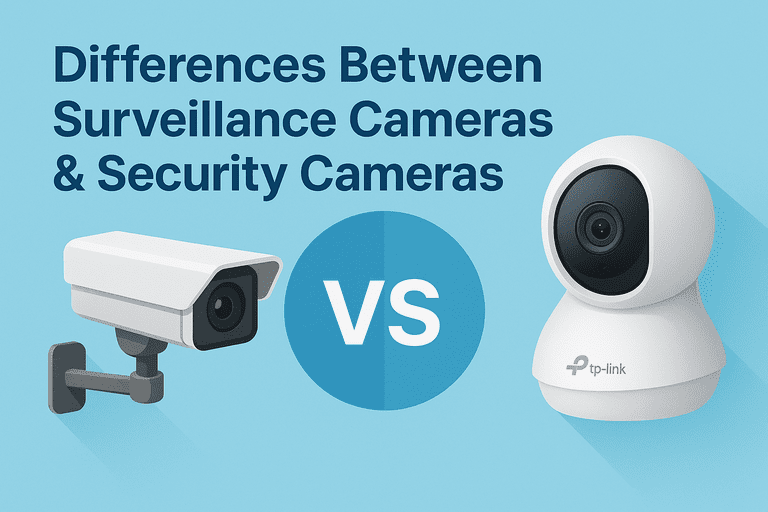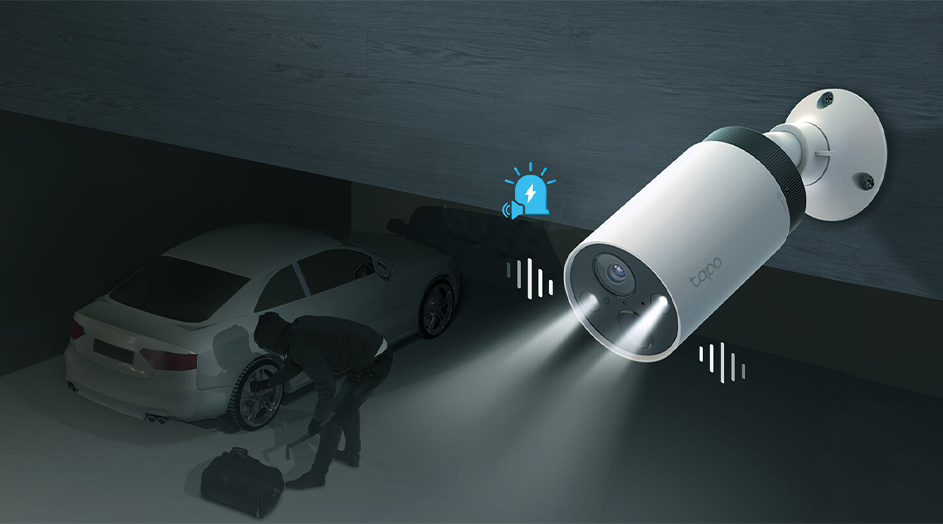What Is a Security Camera and How Do You Buy One?
Security cameras are essential tools because they can provide surveillance, record video, and help deter burglars. Both residential and commercial areas use them to monitor properties, people, and assets. Not only that, they can also gather evidence in a wide range of situations, providing a clear record of events.
If you want to enhance security at home, protect your business, or monitor specific areas, security cameras are the quickest solution. Below, we will explain what security cameras are and offer tips on choosing the right one for your needs.
What are Security Cameras?
Security cameras, also known as surveillance cameras or closed-circuit television (CCTV), are devices that capture and record video footage. From general security and surveillance to specific applications like monitoring children, pets, or elderly family members, they serve a variety of purposes. They are also popular in commercial settings for loss prevention, team member safety, and compliance with regulations.
Security cameras have different types and their functions vary based on installation location, connectivity, and technology. Here are the most common types of security cameras:
-
Wired Cameras: These cameras are connected via physical cables. They are typically more reliable due to their stable connection, but they require a more complex installation.
-
Wireless CCTV Cameras: Wireless cameras use Wi-Fi or other wireless technology to transmit video and audio signals. They offer greater flexibility for installation and are easier to relocate, but may be affected by network issues.
-
IP Cameras: Internet Protocol (IP) cameras operate over an internet connection, allowing for remote access and control through a smartphone or computer. They are versatile and can be integrated into larger security systems.
-
Analog Cameras: These traditional cameras send video signals via coaxial cables to a recording device. They are commonly used in older security systems and are generally less expensive than IP cameras.
Key Features of Security Cameras
When purchasing a security camera, consider the following features to ensure you get the best value for your money:
-
Resolution and Image Quality: The resolution determines the clarity of the video footage. Higher-resolution cameras provide clearer images, which can be crucial for identifying faces, license plates, or other details.
-
Night Vision Capability: Cameras with infrared technology can capture clear images in low-light or dark conditions. This feature is essential for outdoor security cameras or nighttime surveillance.
-
Field of View: This refers to the angle of the camera's lens, determining how much area the camera can capture. A wider field of view covers more space, reducing the need for multiple cameras.
-
Motion Detection and Alerts: Security cameras with motion detection can sense movement and send alerts to your phone or email. This feature is helpful for monitoring your property when you're away.
-
Audio Capability: Some cameras offer two-way audio, allowing you to communicate through the camera. Others can record audio, providing an additional layer of security.
-
Storage Options: Security cameras typically offer cloud-based storage or local storage options, such as SD cards or network-attached storage. Cloud storage provides easy access to footage from anywhere, while local storage can be more secure.
-
Remote Access and Mobile Apps: Most modern security cameras allow you to view footage and control the camera remotely using a mobile app. This feature is useful for checking on your property while you're away.
-
Weather Resistance: If you're installing an outdoor security camera, make sure it's weather-resistant to withstand rain, snow, and extreme temperatures.
Do I Need a Home Security Camera?
There are many benefits to having a security camera at home, in an office, or even in public places. Even if you’re away from home but want extra protection and peace of mind, a security camera could be helpful, and it lets you see what’s happening around your house.
But if you feel safe and have nothing to worry about, then you might not need it. Overall, it's all about what makes you feel comfortable and secure in your home.
Factors to Consider When Buying a Security Camera
When choosing a security camera, consider the following factors to ensure it meets your needs:
Purpose and Location
Determine where you plan to install the camera. Indoor cameras are typically smaller and more discreet, while outdoor cameras are designed to withstand harsh weather conditions. Also, consider their specific purpose. Are you using it for general security, to monitor specific areas, or for other applications like baby monitoring or pet surveillance?
Connectivity
Decide whether you prefer a wired or wireless setup. Wired cameras offer a more stable connection but require more installation effort. WiFi cameras are easier to install but rely on a strong Wi-Fi signal. Then, check if your network can support IP cameras without issues. If you have a weak Wi-Fi signal, you may need to improve your network infrastructure.
Power Source
Security cameras can be battery-powered or wired. Battery-powered cameras offer flexibility in installation but require regular battery changes. Wired cameras need a constant power source but don't require battery replacement. For outdoor cameras, consider solar-powered options. These cameras use solar panels to charge their batteries, providing a sustainable power source.
Installation
Some cameras are simple to install, but others need professional help. Choose whether to install the camera yourself or hire a pro. Consider camera placement and accessibility. Install it where it provides optimal coverage and is tamper-resistant.
Budget
Establish a budget for your security system. Security cameras range in price from budget-friendly to premium models with advanced features. Determine what features are most important to you and find a camera that fits within your budget.
Integration with Other Systems
Consider if the camera integrates with other smart home systems like Google Assistant or Amazon Alexa. This integration allows you to control the camera with voice commands and connect it to other smart devices. Check if the camera connects with other security devices, such as alarms, smart sensors, or smart locks. This integration can enhance your overall security system.
Security and Privacy
Security cameras can pose risks if not properly secured. To protect against hacking and unauthorized access, follow these best practices:
-
Keep the camera's software and firmware up-to-date.
-
Use strong passwords for your camera's online accounts.
-
Enable encryption for data transmission to protect against unauthorized access.
-
Limit access to your security camera network to authorized users only.
Be aware of privacy laws and regulations in your area. Understand your local rules regarding camera placement and recording, and respect the privacy rights of neighbors and visitors.
How Much Does a Security Camera Cost?
The cost may vary based on its features and quality. Basic cameras are more affordable. Security cameras like PTZ with high definition, night vision, or motion detection features will likely cost you more.
There might be additional costs for accessories, like mounting hardware or subscription fees for cloud storage. So think about the features that are most important to you when choosing a security camera.
What Is the Best Security Camera for Me?
It all depends on what you need it for and your budget. If you want something simple and affordable, a basic wireless camera might be a good choice. If you want more features like night vision or motion detection, you might need to spend a bit more.
Look for a camera that's easy to set up and use, and check reviews to see what other people think. Also consider where to put the camera and how to power it—batteries or plugging in. At the end of the day, the best security camera is one that meets your needs and fits your budget.
Here are some of the recommended CCTVs from TP Link:
Tapo CCTV C225:This model allows you to seamlessly forward videos you want to share to your social platforms.
Tapo C420: The Tapo C420 CCTV camera offers excellent waterproof and dustproof performance for outdoor scenarios.
Tapo C310 Outdoor CCTV: Provides a visual distance of up to 98 feet (30 meters) even in total darkness and can record every image in crystal-clear 3MP definition.
Security Cameras FAQs
How do security cameras work?
Security cameras capture video footage using a built-in camera lens. Some cameras record continuously, while others only start recording when they detect motion. The footage is typically stored on a memory card or in the cloud for later viewing.
Where should I put my security cameras?
Security cameras should be placed around your home or property to capture important areas like entry points and vulnerable areas. Common locations include doorways, windows, and driveways.
Are security cameras easy to install?
Many security cameras are easy to install and set up yourself, without the need for professional installation. They typically come with mounting hardware and instructions to help you get started.
Do security cameras record audio?
Some security cameras have built-in microphones that allow them to record audio along with video footage. But it's important to check local laws and regulations regarding audio recording, as it may not be legal in some areas.
Conclusion
Choosing the right security camera involves considering your specific needs, budget, and installation requirements. Take time to research and compare different options, and focus on the features that matter most to you. Remember to prioritize security and privacy to ensure your security camera is effective and secure.
For reliable home security, consider investing in TP-Link security cameras. These cameras are known for their advanced features and high-performance capabilities, offering peace of mind with high-resolution video, night vision, and motion detection.
With TP-Link security cameras, you can monitor your property effectively and stay informed about any unusual activity.


